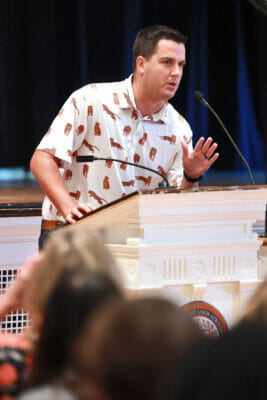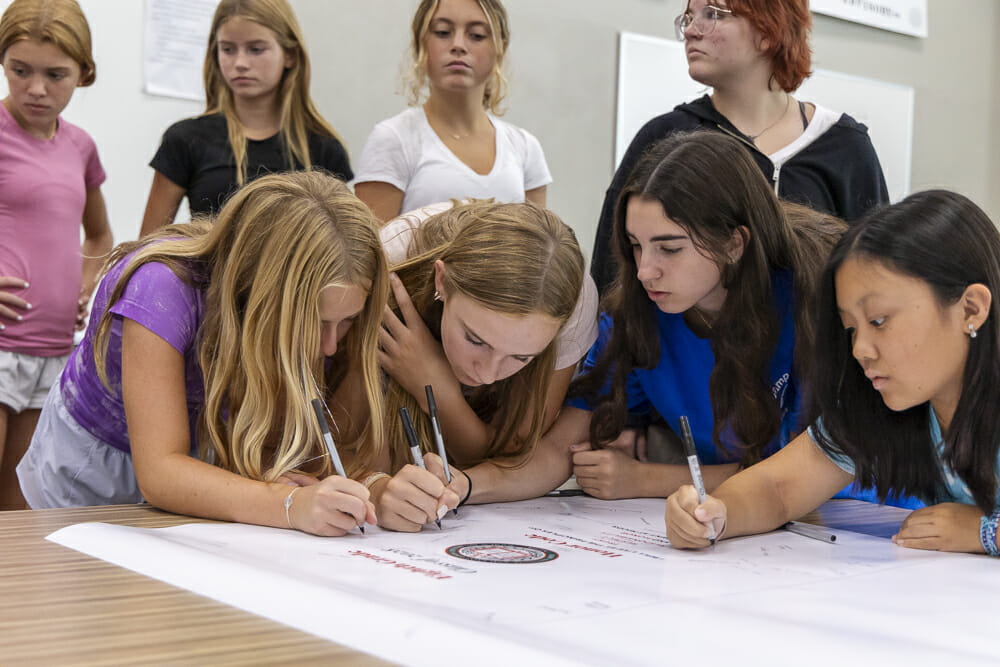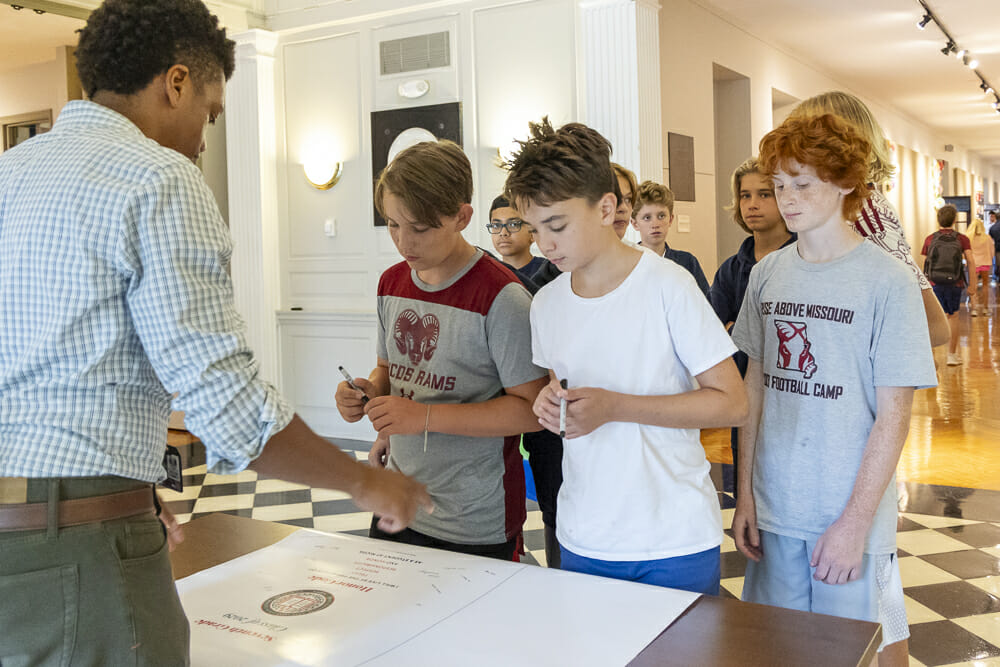One of the most important back-to-school moments in the Middle School is the Honor Code Assembly when students gather in Eliot Chapel to hear from leaders before dispersing to sign their names to on the Code itself. Each class has its own code, and after the students inscribe their names, the codes are framed and hung outside of Eliot Chapel to serve as a reminder throughout the year of the pledge they made.
This week, the students heard from Head of Middle School Jen Schuckman, Middle School History Teacher Blake Whitney, and two fellow Middler Schoolers: Ford Werner ’28 and Lillian Ott ’28. Here’s what they had to say:
Jen Schuckman Lays the Foundation
 Good afternoon and welcome to our Middle School Honor Code assembly. This gathering is always a very important event for our community as we have the opportunity to set the tone for the year and make sure we are aware of what the expectations are and how each of us plays a part.
Good afternoon and welcome to our Middle School Honor Code assembly. This gathering is always a very important event for our community as we have the opportunity to set the tone for the year and make sure we are aware of what the expectations are and how each of us plays a part.
As you know, it has been a long-standing tradition that we close each Middle School gathering with “Do the right thing…because it is the right thing to do.” What you might not realize is that this simple refrain is our collective reminder to always have the Honor Code at the center of our words and actions. It is that voice that we want to echo in our heads and hearts to be sure we are able to make decisions that positively impact self and others. Doing the right thing sounds so easy. Yes, of course I will be kind to others. I could never cheat on a quiz. I promise I will sit by you at lunch. I will take good care of that equipment. And, oftentimes, these are easy decisions to make as they feel right and seem simple enough to see through.
However, there will also be those sticky times, those times of stress or anger or conflict or panic, where the decisions might challenge you. Those are the moments where doing the right thing might be really hard to do or it might be unclear what the right thing actually is. This might be the moment when a friend pressures you to tease someone else to be funny. It is always a convenient escape to say, “just kidding,” but that is likely too little, too late, as feelings have already been hurt. Or when you forget to do your homework and a classmate offers to let you copy theirs. You know if you get another quick comment that you will not be able to participate in your game so you think this might be the better option. Or maybe it is when you want to hurry out to recess so you ignore the milk you spilled on the floor. Surely it is not a big deal since the next lunch group will be cleaning up as well.
Sometimes, circumstances or emotions can trick you into thinking that your decision is reasonable or defendable. “Is it almost doing the right thing?” “Is it really not so bad if no one finds out?” “I promise to do it the right way next time.” While it is easy to repeat our mantra over and over in the chapel, putting those words into action can become a test of your honor. And you will have those moments. School is tough. Life is hard. And choices can sometimes feel impossible.
Last week, I was invited to be on the Hot Seat and one of our wise sixth graders asked me about discipline and what was one of the toughest situations that a student had been in. I shared that when I look back at those types of moments, the ones that really stick in my memory are those where someone has caused intentional, considerable harm to someone else in the community. When someone has been made to feel sad or lonely or unwelcome because someone thought it would be funny or they would feel more powerful or gain popularity. These are the kinds of words and actions that break someone’s spirit and break down trust. These are situations where the well-being of our community is at risk and it seems almost impossible to restore our unity and trust. And I will tell you that no matter the context, these students did not gain power or new friends. They did not feel better about themselves. They only learned that by not doing the right thing, they hurt a lot of people and let themselves and their families down.
Today we pledge our commitment to one another as we sign the Honor Code. Our signatures tell everyone in this room that we will promise to do the right thing and take care of each other. We promise to extend grace and kindness. We promise to care for our buildings and spaces. We promise that everyone will feel safe and welcome. We promise to be our best selves. This is not always going to be easy but it is who we are as the Middle School of MICDS and we are going to help one another keep that promise every day because it is the right thing to do.
And now, I am excited to introduce two eighth graders, Lillian Ott and Ford Werner, who will be sharing their Honor Code reflections with us today. They were the recipients of last year’s Jan deGreef Jacobi award as seventh graders who were recognized for showing compassion, looking for the good in others, and adhering to the Middle School Honor Code. It seems quite fitting to have them speak today. We will close by hearing from Mr. Whitney who will share a few thoughts on the Honor Code.
Thank you to our speakers today and thank you for being an outstanding community of listeners today. Remember when Mr. Rainey mentioned listening and love last week? Hold on to the words of these speakers today and make sure that the little voice is always speaking to you. Listen when you receive guidance. Listen when you make mistakes. Listen when you face tough decisions. Listen when the right path is not the easiest path. We must truly love our community and make our commitment to do the right thing today.
Ford Werner ’28 Speaks about Trust and Respect
 Our Honor Code has four components. I’d like to talk about two of them: trust and respect. Trust and respect are extremely important; in life, they are the easiest to lose and, once lost, the hardest to get back.
Our Honor Code has four components. I’d like to talk about two of them: trust and respect. Trust and respect are extremely important; in life, they are the easiest to lose and, once lost, the hardest to get back.
I think trust was included in our Honor Code because it keeps everyone accountable to each other. Everyone in a community should be able to trust one another. It’s like an unwritten agreement that each of us will follow through with a common understanding and accountability. Our teachers trust that we will make time to do our homework and study. We, as students, trust that the teachers will be fair and have our best interests in mind. We all trust our fellow students to be honest and kind to one another. Here’s an example: on many days, I drop my baseball gear in the MAC in the morning, and I know it’s going to be in the exact spot by the end of the day. Trust is the structure that defines our community—we expect to trust each other, and we do.
When we trust each other, respect easily follows. Students can show respect here at MICDS by treating peers, teachers, coaches, and staff members with empathy and compassion. We say “thank you” to the cafeteria workers and clean up after ourselves. We listen to the ideas shared by others, whether we agree with them or not. We respond to a coach’s on-field instruction, trusting it will make us better athletes. We kid around, but ONLY in fun, and never to hurt feelings. Why? Because we respect each other.
Last year in Mr. Whitney’s class, we learned about world religions and how they, for example, have different diets and customs, many of which are represented within our student body. It shed light on our differences, not to discredit but to respect and appreciate.
This is an amazing school and a warm community. We all play a positive role in it. So remember, trust is earned, and respect is given. Betrayal to either is to lose both.
Lillian Ott ’28 Shares Thoughts on Responsibility and Honor
 Good afternoon Middle School. I am Lillian Ott, one of the two lucky recipients of the Jan deGreeff Jacobi Award. In this assembly, I will be talking about responsibility and honor, two of the four Honor Code components.
Good afternoon Middle School. I am Lillian Ott, one of the two lucky recipients of the Jan deGreeff Jacobi Award. In this assembly, I will be talking about responsibility and honor, two of the four Honor Code components.
Responsibility is a key part of a functioning community. It means and looks like a lot of things. Responsibility means being accountable for your actions and doing your part in the community. It can look like wiping down the table at lunch, studying for an upcoming quiz or test, or even just completing and turning in homework on time. When you are being responsible, you shouldn’t shout out the answer in class, take an extra dessert at lunch, or play on your computer during class (unless it is a funny meme). This significant trait is included in our Honor Code to remind students to be an active member of our community and to be in control of your education. Having responsibility will also help you throughout school in several ways. If you are responsible, teachers will be able to trust you more, and you will be able to develop better study habits. These two things will allow you to have a better and easier school year.
Like responsibility, honor is a big part of a functioning community. For a community to succeed, people must treat each other with respect and honor. Our guiding principles in Middle School are called the Honor Code, but what does honor mean? An online definition of honor is “having a good character and honest behavior.” In my opinion, honor means trying to follow what is right and do the right thing. This is an important trait to have so we can create a positive environment. Some ways you can act honorably in a school environment are to keep promises that you have made with peers or teachers, uphold commitments to sports or after-school activities, don’t cheat on summative assignments, complete your own work, and always be truthful, even if you might get in trouble. It is honorable to admit mistakes when you make them, learn from those mistakes, and not judge others by their mistakes.
Thank you for listening to me talk about how the Honor Code components of responsibility and honor are so important. Have a good day!
Mr. Whitney Shares His Own Experience
 Mr. Whitney told the students a story from when he was in fourth grade. “I had the opportunity to make the right decision when it came to studying for a test and instead made the wrong decision and tried to take the easy way out by cheating.” He spoke about how what Ms. Schuckman and the two students said was true: trust is easy to lose and harder to gain. “Twenty-something years later, I still wonder if my fourth-grade teacher remembers that event and if I lost their trust that day.” He assured students that all the adults with them that day in Eliot Chapel have made mistakes in their lives, and that it’s normal. “No one expects any of them to make no mistakes; it’s how you react to those mistakes and follow up that truly defines us.”
Mr. Whitney told the students a story from when he was in fourth grade. “I had the opportunity to make the right decision when it came to studying for a test and instead made the wrong decision and tried to take the easy way out by cheating.” He spoke about how what Ms. Schuckman and the two students said was true: trust is easy to lose and harder to gain. “Twenty-something years later, I still wonder if my fourth-grade teacher remembers that event and if I lost their trust that day.” He assured students that all the adults with them that day in Eliot Chapel have made mistakes in their lives, and that it’s normal. “No one expects any of them to make no mistakes; it’s how you react to those mistakes and follow up that truly defines us.”





















